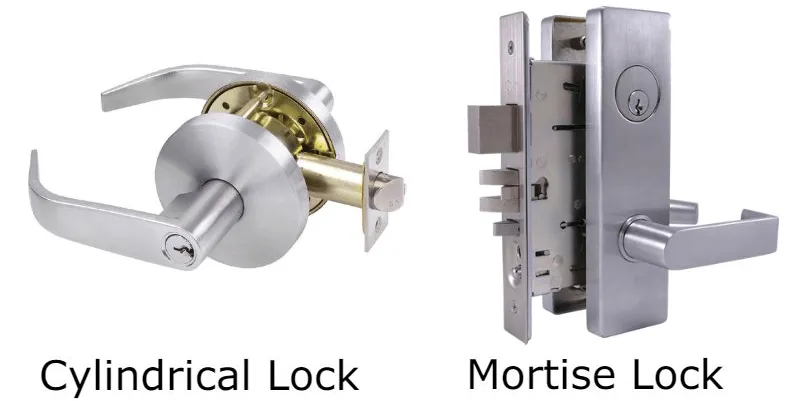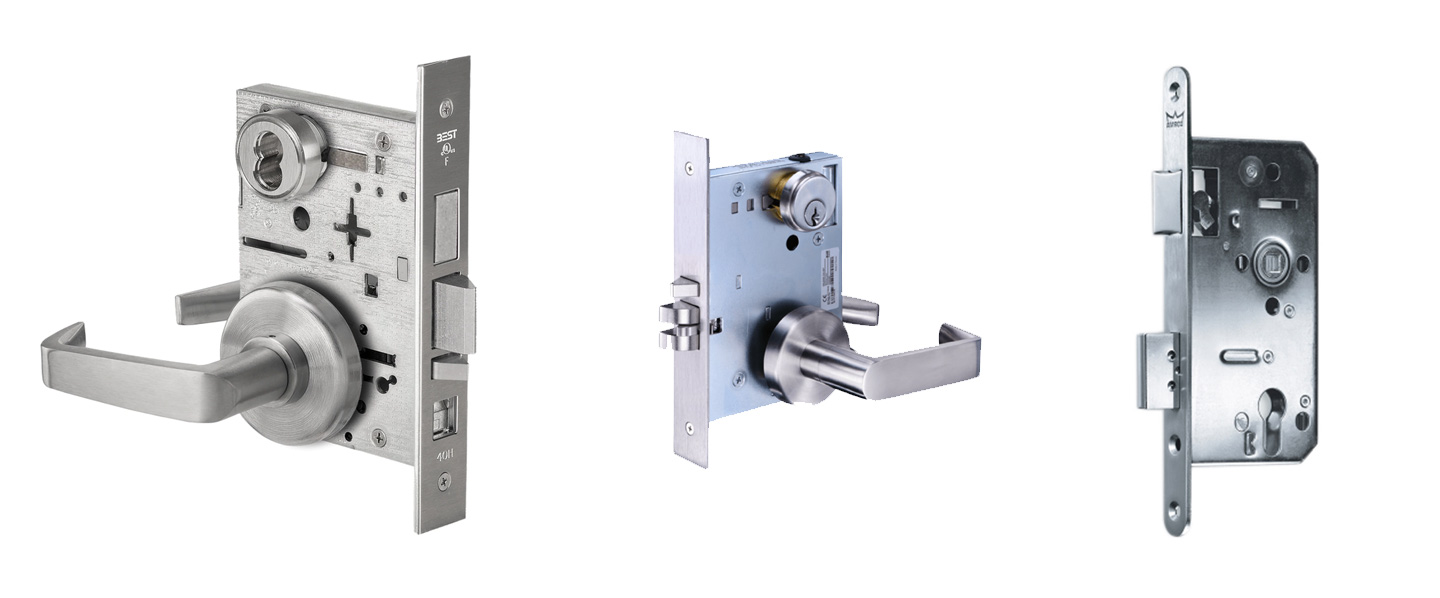Choosing the right lock is a critical decision for both home and business owners. The security of your property largely depends on the type of lock you install. Mortise and Cylindrical locks are two commonly used options. This article aims to dive into the mechanics, advantages, and key differences between these two types of locks, helping you make an informed choice.
What are Mortise Locks?
Mortise locks are a type of door lock that offer high security and durability. The lock body fits into a cavity, called a mortise, cut into the side of the door. These locks often feature a keyed cylinder and sometimes have a lever handle or knob. You usually find them in commercial buildings, institutions, and upscale homes. They’re a great choice for exterior doors where you need strong security. Mortise locks have multiple locking mechanisms, making them hard to pick. They also come in various styles to match your decor.

Advantages of Mortise Locks
High Security
First and foremost, Mortise locks offer a high level of security. They often come with multiple locking mechanisms, such as deadbolts and latch bolts, making them difficult to pick or tamper with. If security is your top concern, a Mortise lock can give you peace of mind.
Durability
Mortise locks are well-known for their durability. Built with high-quality materials like solid brass or stainless steel, they can withstand frequent use and even abuse. Their robust nature makes them an ideal choice for commercial settings or high-traffic areas in homes.
Long Lifespan
Because of their durability, Mortise locks typically have a long lifespan. When you invest in a Mortise lock, you’re making a long-term commitment to security. Over time, this can save you money as you won’t need to replace the lock as frequently as some other types.
Aesthetic Appeal
Another benefit that may surprise you is the aesthetic versatility of Mortise locks. These locks come in a wide range of styles, finishes, and designs, allowing you to match them with your property’s decor. From classic to modern, there’s a Mortise lock for every style.
Versatility in Functionality
Mortise locks also offer various functions to suit different needs. You can find models with privacy functions for bedrooms and bathrooms, entry functions for front doors, and even classroom functions for educational settings. This versatility allows you to customize the lock to fit your specific requirements.
Reduced Wear and Tear on Doors
Since the lock body of a Mortise lock fits inside a cavity in the door, the door experiences less stress during use. This can help prolong the life of your doors, saving you money in the long run.
Better Integration with Advanced Security Systems
If you’re looking to integrate your locks with an advanced security system, Mortise locks often make this easier. Many modern Mortise locks come with features like keyless entry and electronic control, making them compatible with smart home setups.
Professional Installation
While the installation of a Mortise lock is more complex, it often results in a more secure fit. This usually requires a professional locksmith, which adds an extra layer of security as the installation is done right the first time.
What are Cylindrical Locks?
Cylindrical locks are a popular choice for securing doors in homes and offices. These locks have a round shape and fit into a hole cut into the door. You’ll often find a keyhole on the outside and a knob or handle on the inside. To install one, you simply insert the lock cylinder through the hole and secure it with screws. They are easy to install and replace, making them a go-to for many people. However, they’re not the most secure option out there. For high-security needs, you might want to look at deadbolts or electronic locks.
Advantages of Cylindrical Locks
Easy Installation
One of the major perks of cylindrical locks is the ease of installation. You only need a hole in the door and a few screws to secure the lock. This makes it simple enough for a DIY installation, eliminating the need for professional help in most cases.
Cost-Effectiveness
When you’re on a tight budget, cylindrical locks are a great choice. They usually cost less than other types of locks like mortise or electronic locks. This means you can secure your home or office without breaking the bank.
User-Friendly
Cylindrical locks are extremely easy to operate. Turn the knob, use a key, or even enter a code on some models—it’s that simple. This user-friendly design makes them a favorite among people who want a hassle-free locking mechanism.
Versatility
These locks are quite versatile, fitting well with various types of doors—wooden, metal, or glass. You’ll also find them in different styles and finishes, allowing you to match the lock with your door and overall home decor seamlessly.
Low Maintenance
Cylindrical locks have fewer moving parts than other lock types, so there’s less that can go wrong. If you ever encounter issues, the fix is often simple, like a bit of cleaning or a dash of oil to get it working smoothly again.
Easy to Upgrade
Another advantage is the ease of upgrading. If you ever feel the need to boost your security, you can effortlessly replace your cylindrical lock. You can opt for a higher-security model or even switch to a smart lock without making major alterations to your door.
Compatibility with Other Locks
For those concerned about security, cylindrical locks can work in tandem with other lock types, such as deadbolts. This allows for a layered security approach, offering you peace of mind without sacrificing convenience.
Key Differences between mortise and cylindrical locks and Which One to Choose?
Mortise locks and cylindrical locks are two common types of locks used in homes and businesses. They have distinct differences that can impact your security and convenience. In this guide, we’ll explore the key differences between these two lock types to help you make an informed choice.
Installation Process
Mortise locks require a deep cutout (mortise) in the door, making installation more complex and often requiring professional help. Cylindrical locks, on the other hand, are simpler to install as they fit into a pre-drilled hole.
Security
Mortise locks are known for their superior security. They have a heavy-duty construction, with a bolt that extends deep into the door frame, making them highly resistant to forced entry. Cylindrical locks are generally less secure due to their simpler design.
Aesthetics
If aesthetics matter to you, mortise locks offer a classic and elegant look, often found in older buildings. Cylindrical locks have a more modern appearance, fitting well with contemporary decor.
Durability
Mortise locks are built to last. Their robust construction and materials ensure long-term durability. Cylindrical locks may not be as durable, especially the cheaper options.
Key Control
Mortise locks allow for intricate key control systems, making it easier to manage access to different areas of a building. Cylindrical locks are typically more straightforward in this regard.
Price
Cylindrical locks are generally more budget-friendly than mortise locks. If you’re on a tight budget, cylindrical locks may be a better choice.
Ease of Rekeying
Cylindrical locks are easier to rekey, which can be handy if you need to change locks frequently. Mortise locks require more effort and expertise for rekeying.
Functionality
Mortise locks often come with more advanced functions like deadbolts and additional security features. Cylindrical locks are simpler in terms of functionality.

So, which one should you choose?
If security and long-term durability are your top priorities, and you don’t mind a more complex installation, mortise locks are the way to go. They provide excellent protection for your property. However, if you’re on a budget or need a straightforward solution, cylindrical locks can still offer decent security for most applications.
Ultimately, the choice between mortise and cylindrical locks depends on your specific needs and preferences. Consider your security requirements, budget, and the aesthetic you desire when making your decision. And remember, no matter which type you choose, proper installation and maintenance are essential for ensuring the security of your home or business.
